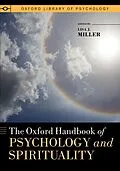Postmaterial spiritual psychology posits that consciousness can contribute to the unfolding of material events and that the human brain can detect broad, non-material communications. In this regard, this emerging field of postmaterial psychology marks a stark departure from psychology's traditional assumptions about materialism, making this text particularly attractive to the current generation of students in psychology and related health and wellness disciplines. The Oxford Handbook of Psychology and Spirituality codifies the leading empirical evidence in the support and application of postmaterial psychological science. Sections in this volume include: - personality and social psychology factors and implications - spiritual development and culture - spiritual dialogue, prayer, and intention in Western mental health - Eastern traditions and psychology - physical health and spirituality - positive psychology - scientific advances and applications related to spiritual psychology With chapters from leading scholars in psychology, medicine, physics, and biology, The Oxford Handbook of Psychology and Spirituality is an interdisciplinary reference for a rapidly emerging approach to contemporary science. This overarching work provides both a foundation and a roadmap for what is truly a new ideological age.
Autorentext
Lisa J. Miller, Ph.D., is Director of Clinical Psychology and Associate Professor at Columbia University Teachers College.
Inhalt
Introduction by Lisa J. Miller Part One: Epistemological and Ontological Assumptions in History and Culture 1. History and Current State of Research on Psychology of Religion Ralph W. Hood Jr. 2. Theoretical and Epistemological Foundations James M. Nelson and Brent Slife 3. Parameters and Limitations of Current Conceptualizations Fraser N. Watts 4. Progress in Physics and Psychological Science Affects the Psychology of Religion and Spirituality Everett L. Worthington Jr. 5. Complementarities in Physics and Psychology C. Edward Richards Part Two: Personality and Social Psychology: Universalism, Absolutism, and Relativism 6. Personality, Spirituality, and Religion Eric D. Rose and Julie J. Exline 7. Overview and Development of a Trait-Based Measure of Numinous Constructs: the Assessment of Spirituality and Religious Sentiments (ASPIRES) Scale Ralph L. Piedmont 8. Good and Evil in Religion: The Interpersonal Context Christopher T. Burris and John K. Rempel 9. Religion, Altruism, and Prosocial Behavior: Conceptual and Empirical Approaches Elizabeth Midlarsky, Anthony S. J. Mullin, and Samuel H. Barkin Part Three: Spiritual Development, Family, and Culture 10. Spiritual Development during Childhood and Adolescence Chris J. Boyatzis 11. Questions Left Unaddressed by Religious Familism: Is Spirituality Relevant to Non-traditional Families? Annette Mahoney and Elizabeth J. Krumrei 12. Motherhood and Female Faith Development: Feminine Tapestry of Religion, Spirituality, Creativity, and Intuition Carole A. Rayburn 13. Colored Spirituality: The Centrality of Spirit among Ethnic Minorities Lillian Comas-Díaz 14. Models of Spiritual Development Harris Friedman, Stanley Krippner, Linda Riebel, and Chad Johnson Part Four: Spiritual Dialogue, Prayer and Intention in Mental Health: Western Traditions Moving Forward 15. Spiritually-Sensitive Psychotherapy: An Impending Paradigm Shift in Theory and Practice Len Sperry 16. Honoring Religious Diversity and Universal Spirituality in Psychotherapy P. Scott Richards 17. Counseling and Psychotherapy within and across Faith Traditions Mark R. McMinn, Kimberly N. Snow, and Justin J. Orton 18. Psychoanalysis, Psi Phenomena, and Spiritual Space: Common Ground Ruth Rosenbaum 19. Spiritual Aspects of Jungian Analytical Psychology: Individuation; Jung's Psychological Equivalent of a Spiritual Journey Joseph P. Wagenseller Part Five: Mind, Awareness, and Spirituality in Mental Health: Eastern Traditions Engage Psychology 20. Contemplative Traditions and Meditation Brendan D. Kelly 21. Translation of Eastern Meditative Disciplines into Western Psychotherapy Randye J. Semple and Sean P. Hatt 22. Eastern Traditions, Consciousness, and Spirituality Kartikeya C. Patel Part Six: Physical Health, Prayer, and Spirituality 23. Spirituality, Science, and the Human Body Wayne B. Jonas, Matt Fritts, Gail Christopher, Maeba Jonas, and Susan Jonas 24. Spirituality, Emotions, and Physical Health Crystal L. Park and Jeanne M. Slattery 25. Spirituality, Religion, and Psychological Counseling Thomas G. Plante 26. Spirituality and Recovery from Serious Mental Problems David Lukoff Part Seven: Positive Psychology and Spirituality 27. Positive Psychology and Spirituality: A Virtue-informed Approach to Well-Being Joseph W. Ciarrocchi 28. Spirituality, Resilience, and Positive Emotions Bruce W. Smith, J. Alexis Ortiz, Kathryn T. Wiggins, Jennifer F. Bernard, and Jeanne Dalen 29. Constructing the Connection between Spirituality, Work, and Family Lee Joyce Richmond 30. Spirituality and Positive Youth Development Peter L. Benson, Eugene C. Roehlkepartain, and Peter C. Scales Part Eight: The Brain and Spiritual Experience 31. Transformation of Brain Structure and Spiritual Experience Andrew B. Newberg 32. Neuroimaging and Spiritual Practice Mario Beauregard 33. The Psychology of Near-Death Experiences and Spirituality Bruce Greyson Part Nine: Postmaterial Spiritual Psychology: Scientific Advances in a Spiritual Ontology for Psychology 34. Nonlocality, Intention, and Observer Effects in Healing Studies: Laying a Foundation for the Future Stephan Schwartz and Larry Dossey 35. Spirituality, Connection, and Healing with Intent: Reflections on Cancer Experiments on Laboratory Mice William F. Bengston 36. Knowledge, Intention, and Matter William A. Tiller 37. Consciousness, Spirituality, and Post-Materialist Science: An Empirical and Experiential Approach Gary E. Schwartz 38. A Post-Materialist Human Science and Its Implications for Spiritual Activism Amit Goswami Part Ten: Conclusion 39. Conclusion Lisa J. Miller
